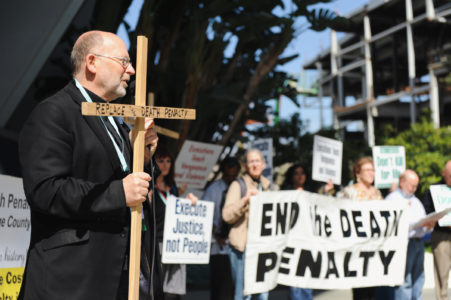By Catholic News Service
WASHINGTON (CNS) – The Aug. 2 announcement that Pope Francis had ordered a revision of the Catechism of the Catholic Church calling the death penalty “inadmissible” was praised by Catholic death penalty opponents in the U.S.
“I am overjoyed and deeply grateful to learn that Pope Francis closed the last remaining loophole in Catholic social teaching on the death penalty,” said Sister Helen Prejean, a Sister of St. Joseph of Medaille, who is a longtime opponent of capital punishment.
Krisanne Vaillancourt Murphy, executive director of Catholic Mobilizing Network in Washington, an advocacy group seeking to end the death penalty, called the news “a capstone teaching moment for the Catholic Church.”
Both advocates, in separate statements, stressed the clarity of the pope’s announcement. Sister Prejean said the Catholic Church “has opposed capital punishment for many years, but the official language used to talk about the issue up to this point has always been equivocal” leaving room for some to say that “executions are morally permissible.”
The catechism’s “new language is very clear,” Sister Prejean said, with its description of the death penalty as “an attack on the inviolability and dignity of the person.” There are “absolutely no exceptions,” she added.
Vaillancourt Murphy said Catholic bishops in every state that have the death penalty have taken stands to see an end to this practice. She said the revision to the catechism “further clarifies any remaining ambiguity about the church’s teaching against the death penalty and strengthens the global resolve to bring an end to this practice.”
Both leaders pointed out that the Pope Francis’ action builds on work begun by St. John Paul II, who spoke of the dignity of guilty and innocent life and described executions as cruel and unnecessary.
“The moral ground zero of this issue in the Catholic context has been the question of self defense and the inviolable dignity of every human being,” said Sister Prejean, who pointed out that there is “nothing dignified about rendering a person defenseless, strapping them down to a gurney and killing them.”

Father Chris Ponnet, chaplain at the St. Camillus Center for Spiritual Care in Los Angeles, speaks during a rally protesting the death penalty in Anaheim, Calif., Feb. 25, 2017. Pope Francis has ordered a revision to the catechism to state that the death penalty is inadmissible and he committed the church to its abolition. (CNS photo/Andrew Cullen, Reuters)
“The moral tectonic plates have shifted,” she added, saying the “very nature of the act of executing a person can no longer be justified.”
But as thrilled as she was by the pope’s announcement, the author of “Dead Man Walking” – about her experience helping death-row inmates – also said the revision is “still just words on a page. Words must be followed by action. It’s time to abolish state-sponsored killing forever.”
Vaillancourt Murphy similarly stressed the reality of the death penalty in the United States, saying 31 states “still have it on the books.”
She also said more than 2,800 people are currently on death row in the United States and 14 executions are scheduled for the remainder of 2018, including three in August.
“These upcoming executions are a stark reminder that the death penalty is active in the United States, and it violates our commitment to the dignity of all life,” she said. “The death penalty is a failed practice that perpetuates the cycle of violence and disproportionately targets marginalized populations, especially people of color, those living in poverty and people suffering with mental illness.”
Hannah Cox, national manager of Conservatives Concerned About the Death Penalty, also issued a statement in support of the pope’s revision.
“(It) reflects what we are seeing in our work with conservative Catholics who increasingly understand the death penalty is a failed and unnecessary policy that does not value life and does nothing to make our society safer,” she said. “We are grateful for the leadership of the Catholic Church, including Popes John Paul II, Benedict XVI, and Francis, in efforts to end the death penalty.”
